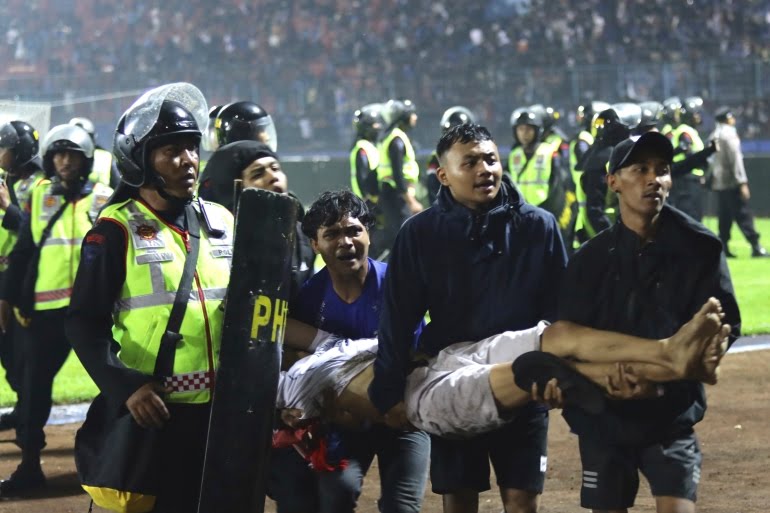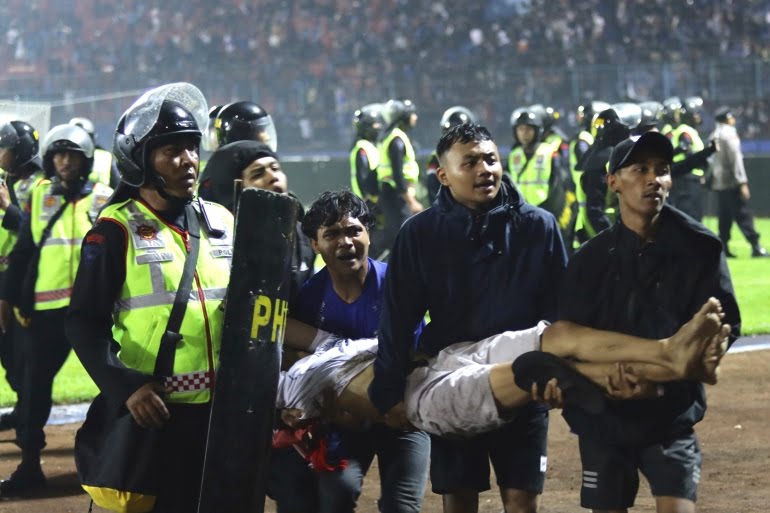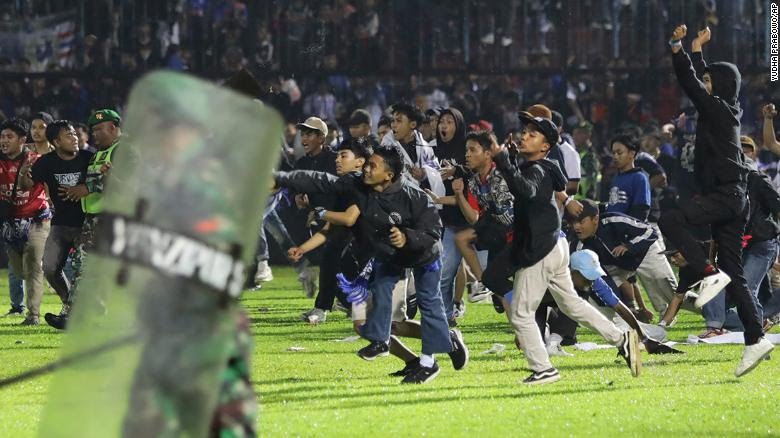Published
3 years agoon
By
Admin
At least 174 people were killed and around 180 injured at a football match in Indonesia after police used teargas in response to a pitch invasion by rioting fans, causing a crush among panicked spectators.
Police and organisers are facing scrutiny over the tragedy, one of the world’s deadliest sports stadium disasters, including questions over the use of teargas inside the venue, which is contrary to Fifa guidance.
The incident occurred after a match in which the Javanese club Arema was defeated by rival Persebaya Surabaya at Kanjuruhan stadium in Malang regency, East Java on Saturday night.
Supporters from the losing side stormed the pitch and authorities fired teargas, leading to a crush and cases of suffocation, said East Java’s police chief, Nico Afinta.Two police officers were among the dead.

Many people were crushed and suffocated when they ran to one exit, Afinta said.
“They went out to one point at the exit, then there was a buildup – in the process of accumulation there was shortness of breath, lack of oxygen.” A hospital director told local TV that one victim was aged five.
The Fifa president, Gianni Infantino, called the events “a dark day for all involved in football and a tragedy beyond comprehension”.
“The football world is in a state of shock” he said. “I extend my deepest condolences to the families and friends of the victims who lost their lives following this tragic incident.”
Social media footage and images showed chaotic scenes in which fans clambered to escape thick clouds of teargas, some trying to carry other injured spectators to safety.

The Indonesian president, Joko Widodo, told authorities to thoroughly re-evaluate security at football matches and ordered the suspension of Liga 1 matches. Saturday’s events should be the “last soccer tragedy in the nation,” he said.
Rights experts have demanded answers over the police response, pointing to Fifa stadium safety guidance that states that “crowd control gas” should not be carried or used by stewards and/or police around the perimeter of the field of play.
Amnesty International’s executive director for Indonesia, Usman Hamid, said this loss of life “cannot go unanswered” and called on the authorities to “ensure that those who are found to have committed violations are tried in open court and do not merely receive internal or administrative sanctions”.
“We also call on the police to review policies on the use of teargas and other ‘less-lethal weapons’ to ensure that such a heartbreaking tragedy never occurs again,” he said.
Teargas should only be used to disperse crowds when widespread violence had occurred and when other methods had failed, and people must be warned of its use and allowed to disperse, Amnesty said.

Questions have also been raised over why the venue was filled beyond its capacity. Indonesia’s chief security minister, Mahfud MD, said in an Instagram post on Sunday that 42,000 tickets had been issued for a stadium that holds a maximum of 38,000 people.
The head of the Malang regency’s health office, Wiyanto Wijoyo, said earlier that officials were still collating the numbers of injured. Victims “died of chaos, overcrowding, trampling and suffocation”, he said, adding that the injured were referred to different local hospitals.East Java’s deputy governor, Emil Dardak, told local media on Sunday that at least 174 people had been killed.Local reports said as many as 3,000 spectators had stormed the pitch. Further clashes occurred outside the stadium.Torched vehicles, including a police truck, littered the streets on Sunday morning.
The Indonesian government apologised for the disaster and promised to investigate its circumstances.
“We’re sorry for this incident … this is a regrettable incident that ‘injures’ our football at a time when supporters can watch football matches from the stadium,” the Indonesian sports and youth minister, Zainudin Amali, told broadcaster Kompas.
“We will thoroughly evaluate the organisation of the match and the attendance of supporters. Will we return to banning supporters from attending the matches? That is what we will discuss.”
Persebaya Surabaya fans were not allowed to buy tickets for the game due to fears of violence between Persebaya Surabaya and Arema FC, who are long-standing rivals.
Mahfud MD said organisers ignored the recommendation of authorities to hold the match in the afternoon instead of the evening.
“This sport … often provokes supporters to express emotions suddenly,” he said on Instagram.
Violence between football fans is a long-running problem in Indonesia. Seventy-eight people have died in football-related accidents over the past 28 years, according to government figures given to Channel News Asia in June.
The Indonesian football association (PSSI) said it would investigate what happened.
“We announced the decision [to suspend the league] after we received a direction from the chairman of PSSI,” Akhmad Hadian said. “We are doing this to respect everything and while waiting for the investigation process from PSSI.”
Other stadium disasters include a 1989 crush in the stands at the UK’s Hillsborough Stadium, which led to the deaths of 97 Liverpool fans, and the 2012 Port Said stadium tragedy in Egypt where 74 people died in clashes.
In 1964, 320 people were killed and more than 1,000 injured during a crowd crush at a Peru-Argentina Olympic qualifier at Lima’s national stadium.






